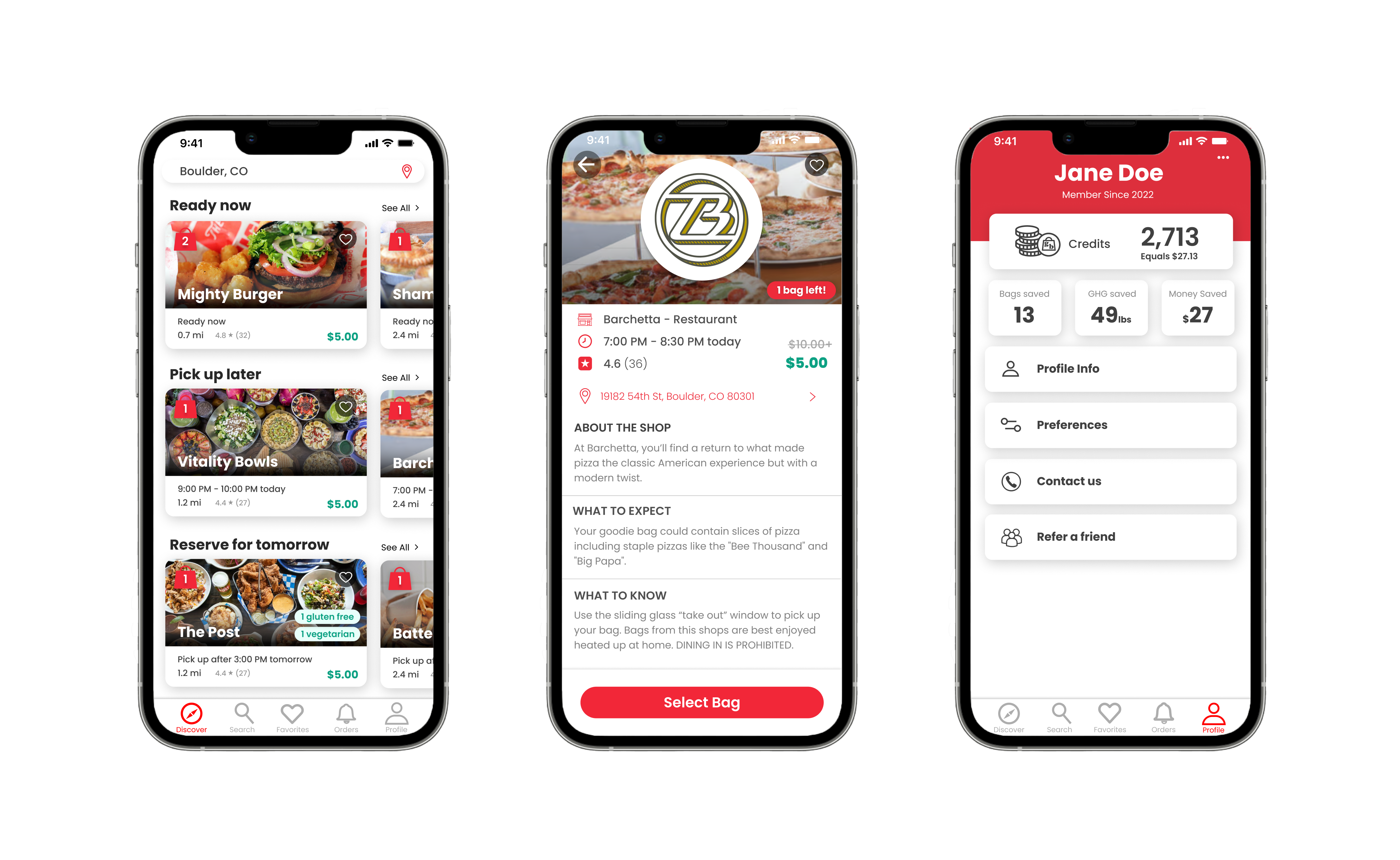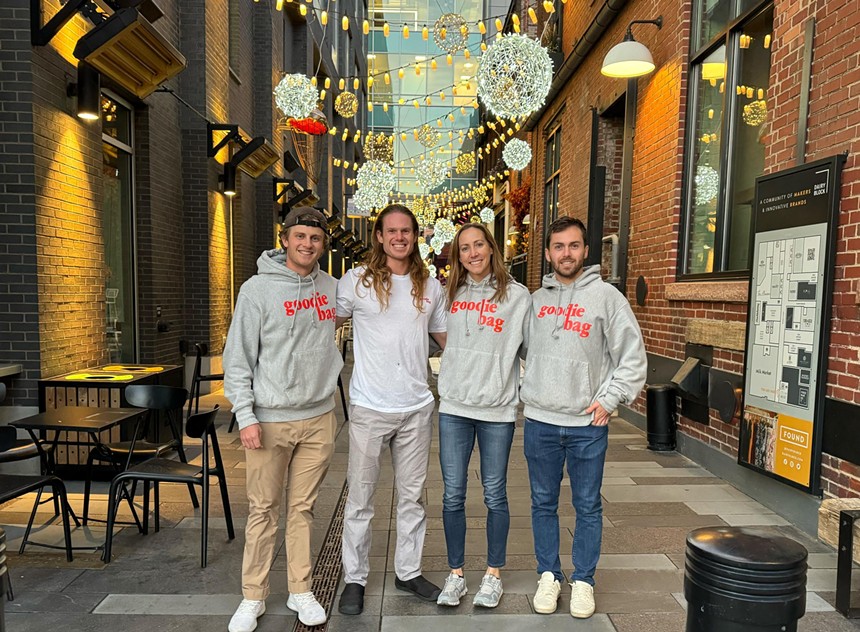
Goodie Bag’s app sells excess food from restaurants and grocery stores. (Courtesy Goodie Bag)
Goodie Bag has added to its purse.
The Boulder-based company, whose app sells excess food from restaurants and grocery stores, closed a $1.3 million pre-seed round at the end of November. It was led by Clear Current Capital, with Stray Dog Capital, MWest Ventures, XORLabs, ABCapital and Responsibility Ventures adding to the bag.
Goodie Bag was founded in 2022 by Eddy Connors and Luke Siegert, who were fraternity brothers at the University of Colorado Boulder.
“I was raised frugally and that instilled those values of being conscientious of consumption,” said Connors, 24. “It always felt wrong to waste good food.”
Goodie Bag aims to solve two problems: food waste and the lost revenue that comes with it. Food establishments post availability and the app pushes notifications out to users so they know when food bags are available. Customers then have a designated time frame where they go in and grab the goods.
The bags are at least half off the original price, and more commonly one third, Connors said.
Goodie Bag has sold 90 percent of its listings to date, he said. The company takes a 33 percent cut of what the customer pays, with the restaurant or retailer taking home the rest.
His company said it has helped sell over 55,000 bags from more than 300 different establishments — including Leroy’s Bagels, Legacy Pie Co. and Post Oak BBQ — since launching in January 2023. That has saved customers over $500,000 and helped restaurants salvage over $300,000 in otherwise sunk costs.
“Our ability to improve their bottom line is incredibly helpful for them to stay in business and keep doing what they do,” he said.
Locally, Goodie Bag’s app is live in Boulder, where it debuted, as well as Denver and Fort Collins. It also serves Charlotte and Charleston in the Carolinas and Milwaukee and Madison, Wisconsin.
Connors said his company plans to expand to several other markets next year. Though he declined to give specifics, Connors said Goodie Bag expects to 10x its number of establishments in 2025 with the help of the cash infusion.
“The goal is to be in every US retail market, starting with the independent local shops that make up 70 percent of that market,” he said.
Part of that money will also go towards hiring two new sales reps, who Connors said go door-to-door to try to corral potential sellers. That operation is manned by Connors’ brother Jack, Goodie Bag’s head of partnerships.
Along with Siegert and the two Connors, Chief Operating Officer Briana Boehmer rounds out the exec team. Goodie Bag also has a staff of five tech engineers and five sales reps.

From left to right: Goodie Bag executives Luke Siegert, Eddy Connors, Briana Boehmer and Jack Connors. (Courtesy Goodie Bag)
But the company isn’t the only one trying to sling surplus food on the cheap. There’s also Too Good To Go, which was founded in Denmark in 2015. Connors said his competitor is in 19 countries around the world and is popular in major U.S. cities such as New York, Los Angeles, Chicago and San Francisco.
Connors said the Danish business targets larger corporations — it works with Whole Foods and Circle K — rather than local, independent shops such as Goodie Bag. He believes there is still a vacuum to fill.
Goodie Bag has also added other offerings to try to differentiate itself. Since the beginning of the year, the app has allowed establishments to post “deals,” which are just lower-priced options.
“It came from partners who were still interested in offering discounted opportunities to customers even when they didn’t have genuine surplus,” Connors said.
The New York native came to Colorado to study entrepreneurship at CU Boulder, and graduated in 2022 after 2 1/2 years. Shortly after, he and Siegert attended Silicon Flatiron’s 10-week startup program, which culminated in the concept for Goodie Bag.
A year later, the company was live and the pair were Techstars Farm to Fork graduates, where they got a $120,000 investment. That was their first institutional funding, and they also raised another $130,000 from friends, family and several angel investors. The recent investment brings Goodie Bag’s total raised to over $1.5 million.
Connors said the company will pursue scale and revenue growth, with eyes on being profitable within the next couple years.
“We technically could not grow anymore and be profitable in existing markets, but that’s not aligned with the journey and mission impact that we’re on,” Connors said.

Goodie Bag’s app sells excess food from restaurants and grocery stores. (Courtesy Goodie Bag)
Goodie Bag has added to its purse.
The Boulder-based company, whose app sells excess food from restaurants and grocery stores, closed a $1.3 million pre-seed round at the end of November. It was led by Clear Current Capital, with Stray Dog Capital, MWest Ventures, XORLabs, ABCapital and Responsibility Ventures adding to the bag.
Goodie Bag was founded in 2022 by Eddy Connors and Luke Siegert, who were fraternity brothers at the University of Colorado Boulder.
“I was raised frugally and that instilled those values of being conscientious of consumption,” said Connors, 24. “It always felt wrong to waste good food.”
Goodie Bag aims to solve two problems: food waste and the lost revenue that comes with it. Food establishments post availability and the app pushes notifications out to users so they know when food bags are available. Customers then have a designated time frame where they go in and grab the goods.
The bags are at least half off the original price, and more commonly one third, Connors said.
Goodie Bag has sold 90 percent of its listings to date, he said. The company takes a 33 percent cut of what the customer pays, with the restaurant or retailer taking home the rest.
His company said it has helped sell over 55,000 bags from more than 300 different establishments — including Leroy’s Bagels, Legacy Pie Co. and Post Oak BBQ — since launching in January 2023. That has saved customers over $500,000 and helped restaurants salvage over $300,000 in otherwise sunk costs.
“Our ability to improve their bottom line is incredibly helpful for them to stay in business and keep doing what they do,” he said.
Locally, Goodie Bag’s app is live in Boulder, where it debuted, as well as Denver and Fort Collins. It also serves Charlotte and Charleston in the Carolinas and Milwaukee and Madison, Wisconsin.
Connors said his company plans to expand to several other markets next year. Though he declined to give specifics, Connors said Goodie Bag expects to 10x its number of establishments in 2025 with the help of the cash infusion.
“The goal is to be in every US retail market, starting with the independent local shops that make up 70 percent of that market,” he said.
Part of that money will also go towards hiring two new sales reps, who Connors said go door-to-door to try to corral potential sellers. That operation is manned by Connors’ brother Jack, Goodie Bag’s head of partnerships.
Along with Siegert and the two Connors, Chief Operating Officer Briana Boehmer rounds out the exec team. Goodie Bag also has a staff of five tech engineers and five sales reps.

From left to right: Goodie Bag executives Luke Siegert, Eddy Connors, Briana Boehmer and Jack Connors. (Courtesy Goodie Bag)
But the company isn’t the only one trying to sling surplus food on the cheap. There’s also Too Good To Go, which was founded in Denmark in 2015. Connors said his competitor is in 19 countries around the world and is popular in major U.S. cities such as New York, Los Angeles, Chicago and San Francisco.
Connors said the Danish business targets larger corporations — it works with Whole Foods and Circle K — rather than local, independent shops such as Goodie Bag. He believes there is still a vacuum to fill.
Goodie Bag has also added other offerings to try to differentiate itself. Since the beginning of the year, the app has allowed establishments to post “deals,” which are just lower-priced options.
“It came from partners who were still interested in offering discounted opportunities to customers even when they didn’t have genuine surplus,” Connors said.
The New York native came to Colorado to study entrepreneurship at CU Boulder, and graduated in 2022 after 2 1/2 years. Shortly after, he and Siegert attended Silicon Flatiron’s 10-week startup program, which culminated in the concept for Goodie Bag.
A year later, the company was live and the pair were Techstars Farm to Fork graduates, where they got a $120,000 investment. That was their first institutional funding, and they also raised another $130,000 from friends, family and several angel investors. The recent investment brings Goodie Bag’s total raised to over $1.5 million.
Connors said the company will pursue scale and revenue growth, with eyes on being profitable within the next couple years.
“We technically could not grow anymore and be profitable in existing markets, but that’s not aligned with the journey and mission impact that we’re on,” Connors said.


